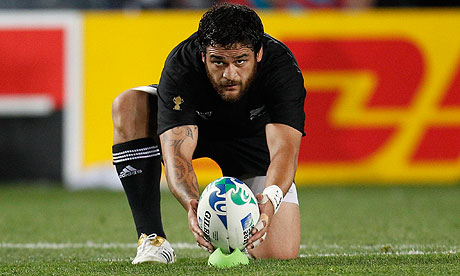
Down at the bottom of North Island, within the city limits of Lower Hutt and the boundary of Greater Wellington, is the small town of Wainuiomata. It is the home town of the All Blacks scrum-half and the two are alike: little and tough. If you've ever wondered, by the way, about the name, Piri Weepu is of Maori and Niuean descent, Niue being 100 square miles of raised coral atoll in the South Pacific, 1,500 miles north-east of New Zealand.
Despite being where the former All Blacks Tana Umaga and Neemia Tialata come from, Wainuiomata is a rugby league town. Piri's brother, Billy, played for the Manly Sea Eagles in the mid-1990s and their mum, Kura, coached the Wainuiomata League under-sevens. In fact, she had Piri in her team and gave one of the greatest quotes ever delivered by a mother about a son: "He was a prick to coach."
When Piri at the age of 14 told the family he was off to join the Hurricanes academy, they had to ask: "Who are they?" Kura is now a security officer in the players' tunnel at the Wellington Regional Stadium – the Cake Tin – and was the first to embrace her boy as he came off the field after the New Zealand-Canada game.
Billy was known as one of the heaviest props ever to play rugby league in Australia, which brings us to the subject of Piri's weight, where perhaps we should let his mother speak again: "He was our runt; now he can't keep the pounds off."
In 2007, three years after he was first capped, Piri was the only player in an All Blacks reconditioning camp to lose weight, an indication his body mass was due to fat not muscle. And that was just his anatomy. Upstairs he was difficult too.
He did not go to the 2007 World Cup in France because he was a walking disciplinary nightmare: lippy, bolshie and boozy. He was toying with going to league and did not answer phone calls from the management of the All Blacks when they returned and wanted to know what he was up to. Could they consider him? Piri let it be known that he was sorting himself out, that he would let them know when he was ready.
If he comes over as an awkward customer, then that is exactly what he is. He is the player who wants to do everything, take the floor and pull the strings and run the show. He was never really going to be the scrum-half to partner Dan Carter at the World Cup because the field wasn't big enough for the two of them.
Given the choice between the little volcano and the ice-cold computer that is Carter, there was only one answer. Carter played and Piri was put on the bench, if he was put anywhere at all. Being left out in the past had almost been better, because he did not make a good sub. There is an art to being a replacement, being externally nothing but supportive and inwardly seething, and Piri never quite mastered the art of concealing his resentment.
At this World Cup, however, it seemed he had already come to terms with his lot. That he might have to be patient. Perhaps he was a little wiser after dislocating and breaking his ankle last October, playing for Wellington against Taranaki. Perhaps sitting around and pondering cruel fate, he acknowledged that if he was just an injury away from missing out then perhaps others were too.
Just for once he took his medicine, went through rehab, lost the stone he had put on while in plaster, took on board that his recovery would be judged only by him responding positively to his treatment. He bit his tongue and waited.
And then Carter collapsed. And the challenge was laid down in the All Black camp, that one player's misfortune had to become another's opportunity. They tried to be calm about it and managed to keep the tremor out of their voice when they said the team would have to improve across the board. But there was panic across the nation. An appeal was launched, almost a cry of despair: who will be the one to save us?
Piri bloody Weepu, that's who. What a week he had. First, he played a one-man emergency service, responding to the alarm – All Blacks in trouble. He dashed down to the bar on North Shore and unceremoniously yanked Israel Dagg and Cory Jane back to the hotel.
Then he took to the field against Argentina at Eden Park and led the haka. Kicked the penalties that kept the All Blacks clear of danger. Provided the service that nursed Aaron Cruden into the game after Colin Slade went off injured. He took the restarts, he wagged his finger at the forwards and added a spice of invention that lit up the team performance, kicking across field or dinking the ball into space. He offered variety and intelligence. He wasn't Dan Carter; he was himself.
He did all of this unaware that two days before, his grandfather had died. As the team celebrated the win, his father, Bill, rang to tell him. On Tuesday Piri flew home to carry his grandfather's coffin at the funeral. Bill spoke of how proud grandfather had been of grandson.
The family may be prouder still. Over the next couple of Sundays, the younger brother might suggest that Billy switches over once the league is finished on the television, because little Piri is going to win the World Cup for the All Blacks.

